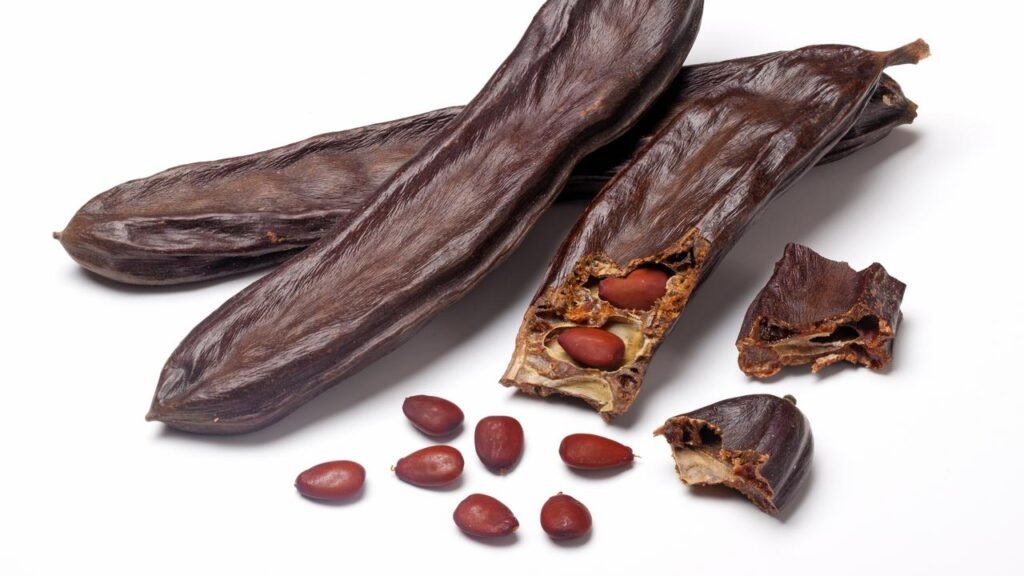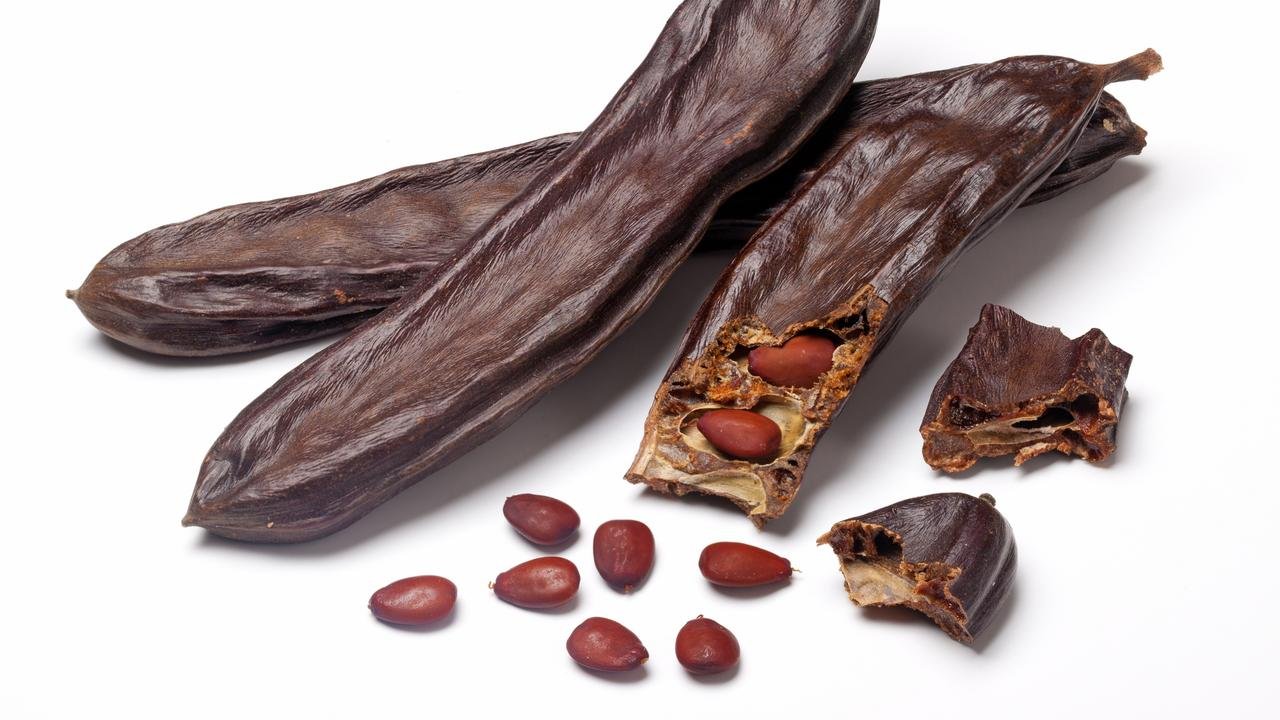Carob—a unique, sweet, and caffeine-free alternative to cocoa—has a rich history in traditional medicine. Grown from the hardy Ceratonia siliqua tree, it’s native to Mediterranean regions and has been widely used in natural healing practices across the globe. Beyond its culinary uses, carob has served as a trusted remedy in alternative medicine, particularly for respiratory ailments, digestive issues, and general wellness. When I was young, I often encountered carob in unexpected places—from herbal stores to my grandmother’s pantry, where she swore by its soothing effects for sore throats and mild digestive complaints. Today, carob is enjoying renewed attention as a natural, nutrient-rich remedy in alternative and holistic wellness practices.
Whether you’re familiar with carob as a food ingredient or new to its medicinal benefits, this article will take you through the historical uses, nutritional highlights, and modern applications of carob in alternative medicine.

The Nutrient-Rich Profile of Carob and Its Role in Wellness
Carob is more than just a chocolate alternative; it’s packed with vitamins, minerals, antioxidants, and fiber, which contribute to its wellness benefits. Nutritionally, carob differs from cocoa in several positive ways, which has fueled its modern popularity as a “superfood.”
Key Nutrients in Carob
- High Fiber Content: Carob is rich in insoluble fiber, supporting regular bowel movements and promoting a healthy digestive system. For many years, people have turned to carob to soothe stomach discomfort and aid in digestion. The fiber helps keep you full and can support weight management efforts by reducing appetite naturally.
- Calcium-Rich for Bone Health: Carob contains a high amount of calcium, about three times more than cocoa powder. Calcium is essential for bone density and strength, making carob an excellent addition to diets that aim to support bone health, particularly for individuals avoiding dairy. It’s a gentle way to add plant-based calcium to your diet.
- Low in Fat and Sugar: Carob is naturally low in fat and contains natural sugars, making it ideal for people looking to reduce their intake of processed sweets. In traditional medicine, carob was used as a natural sweetener, and today, it’s a great choice for those looking to manage blood sugar levels without sacrificing flavor.
- Rich in Antioxidants and Polyphenols: Carob is packed with polyphenols, which are antioxidants that help reduce inflammation and combat oxidative stress. In alternative medicine, polyphenols are valued for their potential to lower the risk of chronic diseases, including heart disease and certain types of cancer.
Carob’s Benefits for Overall Wellness
These nutrients work together to support overall wellness. I often find that carob is easy to add to various foods, from smoothies to baked goods, making it simple to enjoy its benefits without major dietary changes. For example, if you’re seeking a soothing, low-sugar treat, a carob-based snack can be a delicious and healthy alternative.
Respiratory Relief: Traditional and Modern Uses of Carob for Coughs and Sore Throats
In traditional medicine, carob was widely used for respiratory health, particularly in the Mediterranean and Middle Eastern regions, where the tree grows abundantly. Carob syrup, made from boiling carob pods to create a thick, sweet liquid, has long been used to ease sore throats, reduce coughs, and soothe respiratory passages.
Carob Syrup for Sore Throats
Carob syrup’s naturally thick consistency coats the throat, making it a trusted remedy for scratchy, sore throats. Its mildly sweet flavor, paired with the soothing effects of natural sugars and tannins, provides gentle relief, especially during the cold season. I remember the comforting warmth of carob syrup when I had a cold—it was a remedy that felt both healing and familiar, like a hug in a spoon.
In modern herbal medicine, carob syrup is still valued for these qualities. It’s frequently recommended as an alternative to honey or herbal syrups, particularly for children or individuals with sensitivities to more aggressive treatments. Some holistic practitioners suggest combining carob syrup with ginger or thyme for added respiratory support, creating a natural expectorant that helps clear congestion.
Carob’s Role as an Expectorant
Carob’s tannins have been shown to have mild antibacterial and anti-inflammatory effects, which can support respiratory health. In alternative medicine, tannins are valued for their ability to shrink tissues and reduce inflammation, making them helpful in relieving symptoms of colds and sore throats. Carob’s natural sugars and unique phytochemicals help create a gentle expectorant, ideal for people who prefer natural treatments over pharmaceutical cough syrups.
Digestive Support: Easing Digestion and Improving Gut Health with Carob
Carob has been used in various cultures as a natural remedy for digestive issues, from mild stomach discomfort to diarrhea. Its high fiber content, soothing properties, and binding effects make it an ideal remedy for digestive health.
Carob for Digestive Distress
Historically, carob powder or gum was often used to treat diarrhea. Its high tannin content acts as an astringent, which can help bind and reduce excess fluids in the digestive tract. Carob’s tannins are unique in that they soothe the gut lining and can gently firm up loose stools. In fact, parents in the Mediterranean region would often mix carob powder with water to give to children with mild diarrhea—an effective and natural approach that doesn’t disturb the gut flora.
Supporting Gut Health Through Prebiotics
The fiber in carob acts as a prebiotic, supporting the growth of beneficial bacteria in the gut. Prebiotics are essential in alternative medicine because they help nourish the “good” bacteria in our intestines, which in turn promote better digestion, immunity, and even mental health. I was surprised to learn that carob could benefit gut flora, and I now incorporate carob into my diet as a prebiotic food.
Blood Sugar Regulation and Weight Management
Carob’s naturally low glycemic index and high fiber content make it a great option for people seeking to manage blood sugar levels, especially those with diabetes or insulin sensitivities.
Carob for Blood Sugar Balance
Studies have shown that carob’s fiber content slows down the absorption of sugar, preventing blood sugar spikes. Its natural sugars are also absorbed more slowly than refined sugars, making it a suitable option for those who want to avoid rapid glucose increases. Carob’s low glycemic impact is one reason why it’s recommended as a cocoa substitute for people with blood sugar concerns.
Weight Management with Carob
Carob’s fiber helps maintain satiety, curbing appetite and aiding in weight management. When I began using carob regularly, I noticed a subtle reduction in my cravings for sweets. Carob’s natural sweetness makes it a satisfying snack option, particularly when mixed with nuts or added to yogurt.
Carob’s Use in Holistic Wellness and Alternative Medicine Practices
In recent years, carob has become popular in holistic wellness as an ingredient in natural beauty products and supplements, and as a substitute for cocoa in various recipes.
Herbalist Perspectives on Carob’s Benefits
Many herbalists value carob for its gentle effects on the body and its suitability for various populations, from children to the elderly. An herbalist friend of mine, for example, regularly recommends carob syrup for clients who experience seasonal asthma or chronic coughs, as it provides relief without any stimulating effects.
Carob in Modern Herbal Supplements
Carob is increasingly included in modern herbal formulations for digestive and respiratory support. Companies are producing carob-based syrups, powders, and tablets that make it easier to incorporate into daily routines. These supplements are often free from caffeine and other stimulants, making them suitable for sensitive individuals or those with specific dietary restrictions.
Nutritional Comparison: Carob vs. Cocoa in Alternative Diets
For those comparing carob to cocoa, here’s a closer look:
| Nutrient | Carob | Cocoa |
|---|---|---|
| Caffeine | None | Contains caffeine |
| Calcium | High | Moderate |
| Theobromine | None | Contains |
| Fiber | High | Moderate |
| Sugar | Naturally sweet, low glycemic | Often needs added sweeteners |
Carob offers a naturally sweet, caffeine-free alternative to cocoa, making it ideal for individuals avoiding stimulants or seeking a lower-sugar lifestyle.
Conclusion: Embracing Carob as a Natural Wellness Ally
From soothing sore throats and coughs to supporting digestion and managing blood sugar, carob’s extensive history in traditional medicine is backed by a range of health benefits. This powerful pod has been a valued remedy across cultures for centuries and continues to offer therapeutic benefits in today’s holistic wellness practices. As more people turn to natural alternatives for preventive and supportive health care, carob stands out as a nutrient-dense, versatile option.
With its gentle sweetness, nutrient profile, and health-supporting qualities, I wholeheartedly recommend giving carob a try—whether as a remedy, a daily supplement, or simply a delightful, health-conscious treat.









